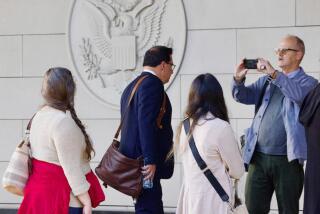He helped the FBI take down Councilmember Jose Huizar. Now, he’ll avoid jail time

- Share via
He kept thousands of text messages. He took photos of bribe money. He recorded his boss, then-Los Angeles City Councilmember Jose Huizar, demanding that money in a City Hall bathroom.
George Esparza, a central figure in Huizar’s sprawling pay-to-play operation, provided federal prosecutors with a huge trove of evidence for their investigation into bribes from downtown real estate developers seeking city support for their projects. He met with prosecutors more than two dozen times and provided crucial testimony at four separate trials, his attorney said.
On Friday, U.S. Dist. Judge John F. Walter called Esparza’s cooperation “nothing short of extraordinary.” He sentenced Esparza to three years of probation, even after pointing out that Esparza had committed a long list of crimes himself.
“In my 20 years as a district court judge ... I have not seen a defendant who has provided such extensive and helpful cooperation to the government,” Walter said.
Esparza, 38, had faced the possibility of several years in prison. He initially lied to FBI agents who were investigating City Hall corruption, eventually pleading guilty in 2020 to a single count of conspiring to violate federal anti-racketeering law.
For years, Esparza served as a front man for Huizar, relaying the council member’s demands for bribes or other financial benefits using coded language.
Nevertheless, prosecutors recommended that Esparza receive no prison time, saying he had taken responsibility for his crimes over the last six years. Without his cooperation, “the public may have never known the full scope” of Huizar’s corruption, Asst. U.S. Atty. Susan Har told the judge.
Standing before the judge, Esparza apologized to his family, to the city of Los Angeles and to his neighborhood of Boyle Heights, where he grew up and still lives. He acknowledged that he had enjoyed a lavish lifestyle afforded by his crimes.
“At the time, I was a mini-Jose Huizar,” he told the judge.
Huizar pleaded guilty in January to tax evasion and racketeering charges. He reported last month to the Federal Correctional Institution Lompoc II, a low-security prison in Santa Barbara County, to serve a 13-year sentence.
For several years, Esparza accompanied Huizar on trips to Las Vegas with Chinese real estate developer Wei Huang, who had been looking to develop a 77-story skyscraper in Huizar’s district. Esparza and Huizar received lavish hotel rooms, expensive meals, casino chips, prostitutes and other benefits from Huang, according to Esparza’s plea agreement, which he signed in 2020.
As Huizar’s intermediary, Esparza served as a go-between for another bribery scheme — this one involving the developer of a planned 20-story residential tower at Hill and Olympic in downtown Los Angeles. That developer, Dae Yong Lee, was sentenced to six years for arranging a $500,000 bribe.
Esparza also secured financial benefits on his own, including at least $48,000 in consulting payments from a businessman looking to pitch home automation products to downtown high-rise developers.
Friday’s sentencing was the third in five days for participants in Huizar’s so-called “criminal enterprise.”
On Monday, former lobbyist Morrie Goldman received three years of probation and six months of home detention, along with a $60,000 fine. Goldman pleaded guilty in 2020 to a single count of conspiring to commit bribery.
A day later, real estate consultant George Chiang was also sentenced to three years of probation, along with 12 months of home detention and 150 hours of community service. Chiang, who pleaded guilty to one count of conspiring to violate federal racketeering law, also must pay a $250,000 fine.
As part of his sentence, Esparza must serve 12 months of home detention and 300 hours of community service. He must pay restitution of $130,459 to the city of Los Angeles.
Ezparza first joined Huizar’s staff as an intern at age 19. He returned to Huizar’s office after college, eventually rising to the position of special assistant, serving as his driver, his confidant and his emissary to lobbyists, consultants and others.
In legal filings and during Friday’s hearing, Esparza said he viewed Huizar as a father figure who had been missing from his life. Esparza said Huizar’s own relatives referred to him as Huizar’s “first-born son.” His voice cracking, he said he had put his actual family “through hell.”
FBI agents raided his grandparents’ Boyle Heights home, where he lived, in 2018. He said his grandfather, who had raised him to be a moral person, watched as he was put in handcuffs.
“I failed them as a big brother, as a son and as a grandson,” he said.
Walter said that, after watching Esparza testify at four trials, he was convinced that Esparza fully embraced the luxurious lifestyle that resulted from his corruption. At the same time, he called Esparza’s written request for leniency “one of the most sincere and persuasive” he had ever read.
After the hearing, Esparza said he was “very grateful for this moment” — even hearing Walter describe his crimes in detail.
“It was hard to hear the judge be truthful with me,” he said. “But the first part of your redemption journey is being truthful.”
More to Read
Sign up for Essential California
The most important California stories and recommendations in your inbox every morning.
You may occasionally receive promotional content from the Los Angeles Times.











